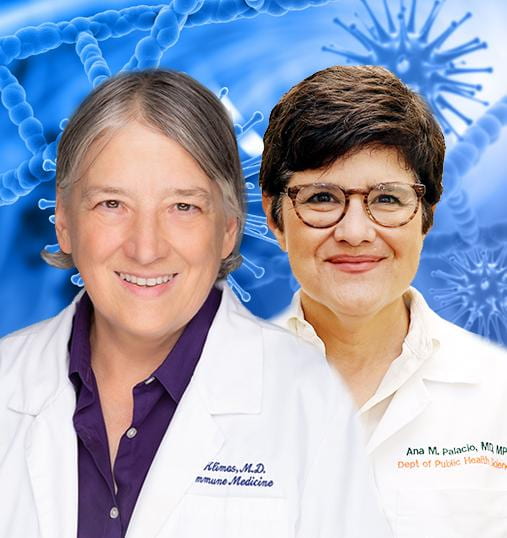“Less than half the people who have long COVID know they have it…” —Nancy Klimas, M.D., director of NSU’s Institute for Neuro-Immune Medicine
The COVID-19 pandemic may feel as though it has come and gone, but that is not the case. A positive COVID-19 test has the power to affect someone’s life long after a 14-day quarantine. NSU’s Institute for Neuro-Immune Medicine (INIM) is on a mission to understand why this is happening and how they can help. INIM is currently running a long COVID research study in partnership with the Centers for Disease Control and Prevention. The COVID-19: Understanding the Post-Viral Phase (COVID-UPP) study is being led by Nancy Klimas, M.D., director of NSU’s Institute for Neuro-Immune Medicine. Ana M. Palacio, M.D., M.P.H., practicing physician with the Miami Veterans Affairs Healthcare System, is the co-principal investigator of this study.
“People don’t know that long COVID exists as a phenomenon. ‘Are you really the person you were before you had COVID?’ They may not realize it’s a cause of fatigue… it’s so nonspecific, people often don’t go to the doctor when they are experiencing fatigue,” Klimas said. Long COVID can cause many confusing symptoms, including fatigue, palpitations, low blood pressure, gastrointestinal (GI) disturbances, pain in the joints and muscles, nonrestorative sleep, and waking exhausted. Often, efforts to exercise seem to make it all worse.
The clinicians at INIM have seen individuals discount their symptoms simply because they aren’t aware of long COVID as a phenomenon. They are also seeing individuals who don’t have reassurance from their peers and primary physician. The truth is anyone who has had COVID-19 can develop long COVID.
“Patients with long COVID find that the support you would get with a ‘normal’ illness tends to be absent and skeptical at times. I cannot think of an illness where it is more important to have your family’s support, as well as a caring and expert clinical care team. The first thing we tell our patients is ‘we believe you; this is real.’ Validation alone is a great big step in their care,” Klimas said.
Klimas has been working on this study for two years and is collecting more data through 2024. The COVID-UPP study team is currently recruiting individuals between the ages of 18 and 65 who are still experiencing symptoms three months after receiving a positive test result. Klimas has seen the effects of this neuro-immune illness firsthand and is working diligently to understand the complexity of this long-term illness.
“I have a 35-year history of treating people with post-viral illness, and we (INIM) have nine practitioners in our clinic with more than 200 years of combined clinical experience with post-viral illnesses. We want to treat the actual causes rather than the symptoms,” Klimas said. Palacio is just as passionate, establishing one of the first Veterans Affairs (VA) clinics dedicated to caring for post-COVID illness in veterans at the Miami VA Medical Center.
The COVID-UPP study is designed to help researchers explore the similarities and differences between COVID-19 and other long-term illnesses, such as myalgic encephalomyelitis/chronic fatigue syndrome (ME/CFS). ME/CFS is one of the main areas of focus at INIM. Clinicians at the institute have seen illnesses like ME/CFS go from being dismissed to receiving national funding for research.
“ME/CFS wasn’t seen as a real illness for a long time. We didn’t have the federal dollars to translate advances in our understanding of the mediators of this serious chronic illness into care. Long COVID has received more funding in one year than ME/CFS has in 30 years combined,” Klimas said.
Klimas was passionate about this type of research long before COVID-19. She is driven in her care and determination to help her own patients with ME/CFS and is angered by the indifference they have experienced as patients and as advocates. But her optimism and resilience come from the medical advances and innovation she has not only witnessed but also helped create.
“I spent the first 10 years of my research career doing HIV studies. I had the stress and sadness of losing many patients to AIDS. Now, the patients I took care of who survived to the mid-90s are here today, some who were in hospice care. It was emotionally taxing, but I stuck it out and it was probably one of the most gratifying experiences I’ve been a part of. I was there for the ‘aha’ moment, and I would like to see that again for long COVID and ME/CFS. I think we (INIM) are major players in making that happen,” Klimas said.
The COVID-19 pandemic can feel like a never-ending cycle for those who have developed Long COVID, but the clinicians at INIM are eager to be part of the solution.

